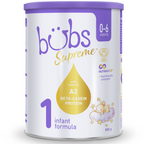When Do Babies Start Walking?
Watching your baby achieve milestones is an exciting and joyous experience. Among the major developmental milestones, walking is a significant one that marks a new era of exploration and independence for your little one. Remember, every baby is unique and will reach this milestone at their own pace, so be patient and supportive throughout the process.
When do babies start walking?
The journey to walking involves several stages, varying from one baby to another. On average, most children take their first baby steps between 10 and 18 months old. However, before they take those first independent steps, they will be busy exploring their environment by crawling and pulling themselves up to stand, which usually happens between 9 and 12 months. It's important to note that these timeframes are approximate, and some babies may start walking earlier or later without any cause for concern. Instead of worrying about delays, focus on providing positive encouragement and ample opportunities for practice.
Signs your baby will start walking soon
As your baby gets ready to walk, you may notice some telltale signs that indicate they are on the cusp of taking their first baby steps. These signs may include:
- Pulling up on objects to stand
- Increased confidence
- Cruising
- Bouncing
How to encourage your baby to walk
Supporting and encouraging your baby as they learn to walk is essential for their development and confidence. Here are some tips to help them on their way:
- Offer support and assistance: Stabilise your baby to provide balance and support while they practise standing and taking steps.
- Encourage cruising: Use sturdy furniture that won't tip over to support your baby as they move around. This will help them gain confidence in their ability to stand and move.
- Use toys as encouragement: Place toys just out of reach or at reachable heights to motivate your baby to reach up and down, strengthening their leg muscles and building coordination.
- Keep them barefoot: Allowing your baby to walk barefoot on safe, clean surfaces helps strengthen the muscles in their feet and aids sensory development.
- Play together: Engage in activities involving walking or standing to encourage them to explore their surroundings as they take their first baby steps.
- Praise their progress: Celebrate every small step your baby takes towards walking independently. Positive reinforcement can boost their confidence and motivation.
Reasons for late walking in babies
It's important to remember that all babies develop at their own pace. Some babies may start walking earlier, while others may take longer. There can be various reasons for late walking in babies, such as differences in muscle strength, coordination and overall development. Comparing your baby's progress to others can lead to unnecessary worry. Instead, focus on providing a supportive and nurturing environment for their growth.
How to prepare for your baby to walk
As your baby approaches the walking phase, ensuring your home environment is safe for any tiny explorers is crucial. Baby-proof your home by removing sharp corners, securing furniture to walls and eliminating trip hazards like rugs. It’s also a good idea to install safety gates to create a safe space for your baby to explore.
It’s never too early to start facilitating your baby's learning to walk. Encourage your baby's early motor development through tummy time and other activities that promote strength and coordination. While it may be hard to watch as a parent, falls are a natural part of the learning process. Be there to comfort your baby if they stumble and monitor any serious accidents.
The journey to walking is an exciting time for babies and parents. Every baby progresses at their own pace, and there's no need to compare their development to others. If you have concerns about your baby's walking progress or any other developmental aspect, consult with a healthcare professional. A baby’s first steps only happen once, so remember to celebrate each stage of their progress and provide a supportive and loving environment as they reach this exciting milestone.


